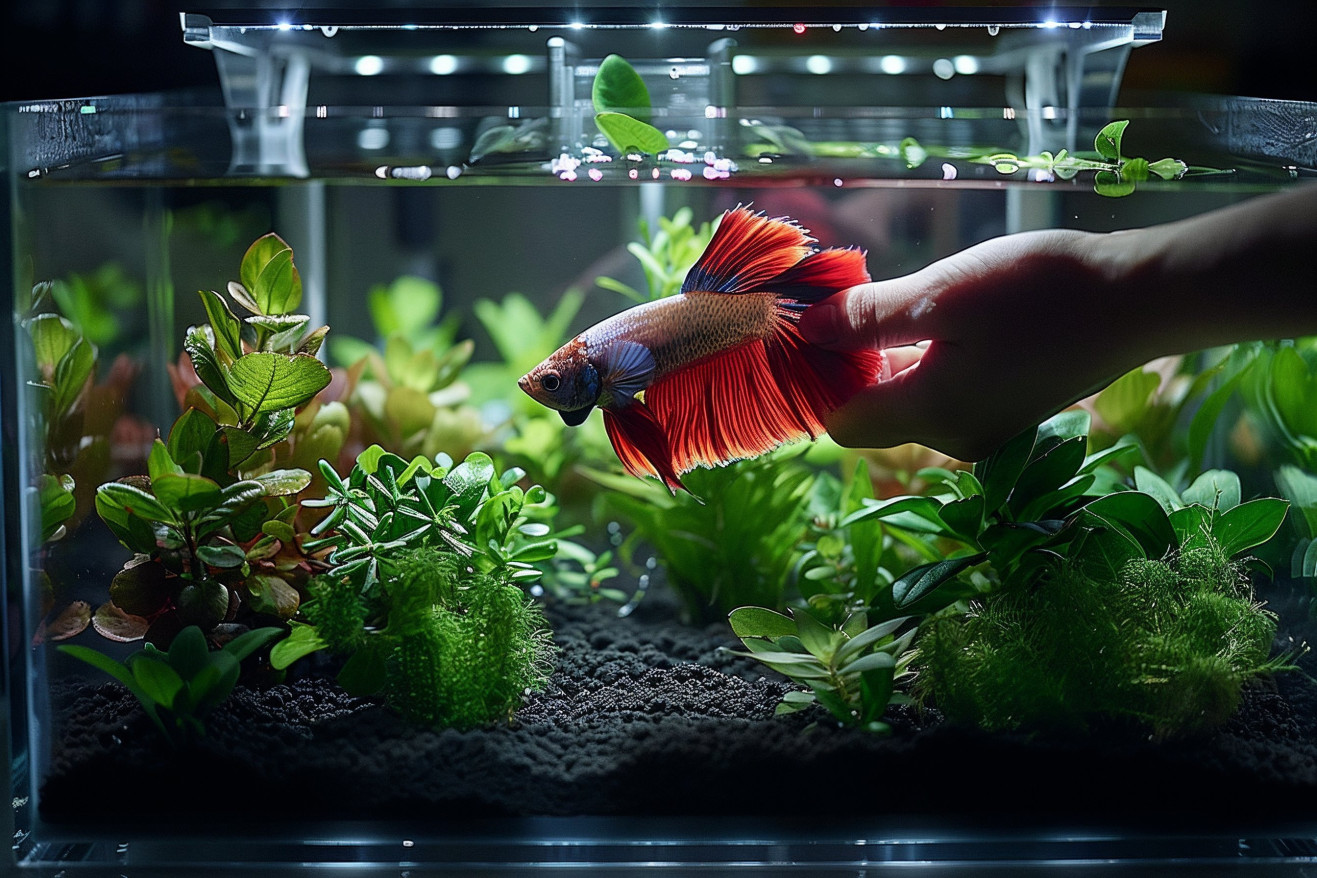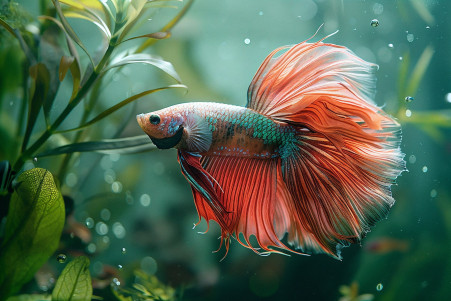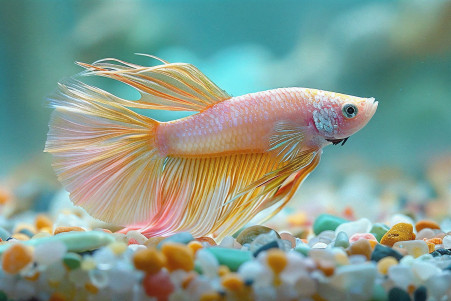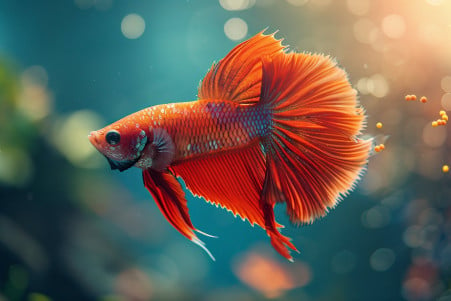How to Clean a Betta Fish Tank Without Stressing Out Your Fish: A Complete Guide
10 June 2024 • Updated 10 June 2024

So, how can you make sure that your betta fish's tank stays clean without causing your fish too much stress? A good general rule to follow is to perform a 25% partial water change once a week, and make sure you use an algae scrubber and siphon vacuum to clean the gravel and decorations. Don't forget to add dechlorinating solution back into the tank, and stay away from harsh chemicals that could hurt your betta.
To make sure that you have all the information you need to keep your betta fish's tank clean and healthy, we will cover the most up-to-date expert advice on the topic. This will include everything from the right way to set up your tank to the best water conditions to the best practices for regular maintenance that will help keep your betta fish happy and healthy. Once you know exactly what your betta fish needs, you'll be ready to set up an environment where it can thrive.
How can I clean a betta fish tank without stressing out the fish?
Why You Need to Change the Water Regularly
Water changes are an important part of keeping your betta fish tank healthy. As noted by Bettaboxx, the best time to change the water is when you're cleaning the tank. The frequency of water changes will depend on the size of the tank and whether or not it has a filter. For unfiltered bowls, WikiHow recommends changing 30-50% of the water once a week, while for filtered tanks, changing 20-25% of the water once a week is enough.
It's important to make sure that the water you're adding back into the tank is dechlorinated and the same temperature as the water that's already in the tank so that you don't shock your betta. As noted by Beautiful Bettas, the water should be treated with a water conditioner before it's added to the tank to remove chlorine and other harmful chemicals. This will help you maintain consistent water parameters.
There are many benefits to regular water changes. They help remove waste and the ammonia that builds up in the tank, they help replenish the oxygen in the water, and they help prevent too much algae from growing in the tank. All of these things are important for your betta's health and the health of the tank. If you don't change the water regularly, you may find that the ammonia levels in the tank become too high and the water quality becomes poor, both of which can be dangerous for your betta. Regular partial water changes will help ensure that you have a clean, healthy underwater environment for your betta.
How to Clean Betta Fish Tank Decorations and Accessories
Keeping your betta fish tank's decorations and accessories clean and well-maintained is essential for ensuring a healthy living environment. As the Betta Fish Forum explains, it's important to remove decorations one at a time to avoid upsetting the tank's ecosystem.
To clean your decorations and accessories effectively, the Betta Geeks suggest a range of cleaning methods including boiling, soaking in bleach or vinegar solutions, and using hydrogen peroxide. You can start by boiling your decorations for 20-60 minutes to kill algae, as recommended by wikiHow. Then, you can create a 5% bleach solution and soak the decorations for 5 minutes to ensure that any remaining algae is killed. Make sure to rinse the decorations in dechlorinated water for at least 20 minutes to ensure that all chemicals have been removed before returning them to the tank.
It's also important to ensure that the decorations are completely dry before returning them to the tank to prevent the spread of any potential pathogens. Make sure to avoid introducing any harmful substances while handling and cleaning your decorations that could be toxic to your betta fish. By following these instructions, you can make sure that you're keeping your betta's tank accessories clean while also keeping their health and safety in mind.
Keeping the Betta Fish Tank Filter Clean
A good filter is essential for keeping the water in a betta fish tank clean. As noted by PetMD, filtration can be very helpful for betta fish because it removes toxins such as ammonia and oxygenates the water. The filter should be able to cycle the water in the tank at least four times an hour.
That said, bettas don't like strong water flow, so it's important to make sure the filter has an adjustable flow rate and that the flow rate is low in the tank. As suggested by FishLab.com, the filter should be checked regularly to make sure it's working and free of algae. The filter media should be cleaned or replaced once a month based on the water quality and the number of fish in the tank.
When cleaning the filter, it's important to be gentle so as not to disturb the beneficial bacteria that help with biological filtration. As pointed out by PetMD, the filter should be handled and cleaned with care to avoid introducing chemicals or contaminants into the tank. With proper care and maintenance, a good filter will keep your betta fish healthy and happy.
How to Make Water Changes and Tank Cleanings Less Stressful
It's important to minimize stress during water changes and tank cleanings. The Betta Fish Forum notes that stress stripes, hiding, and rapid gill movement are all signs of stress in bettas.
To minimize stress, carefully remove your betta from the tank and place them in a small, clean container while you clean the tank, as suggested by the Betta Fish Forum. When you return your betta to the tank, make sure to acclimate them slowly.
You can also help reduce stress by keeping the environment as calm as possible. PetHelpful recommends turning the lights down or using stress coat products during and after the cleaning process. By making sure your betta feels safe and secure, you can help ensure that the cleaning process goes as smoothly and stress-free as possible.
Planted Betta Fish Tank Care
There are many advantages to adding live plants to a betta fish tank, as outlined by Buce Plant. Not only do plants offer natural hiding places, but they also help oxygenate the water, which is essential for a healthy betta. According to Florida Aquatic Nurseries, Java fern, Cryptocoryne, and Anubias are all great low-maintenance plant options for betta tanks.
When setting up a planted betta tank, it's important to choose the right substrate and make sure the tank has enough light. As noted by Buce Plant, Fluval Stratum is a nutrient-rich soil-based substrate that will help the plants grow. Meanwhile, bettas need a high-quality LED light that stays on for 8 hours a day to help keep the live plants healthy.
To keep a planted betta tank in good condition, it's important to clean it carefully so you don't disrupt the tank's delicate balance. Florida Aquatic Nurseries recommends using a soft cloth or sponge to clean the glass, and avoiding any cleaning products that could be toxic to the plants or your betta. By making sure that you have a well-balanced, natural tank with live plants, you can make sure that your betta has a healthy and stimulating environment.
Conclusion: How to Keep Your Betta's Tank Clean
By following the techniques and considerations outlined in this article, you can clean your betta's tank effectively while minimizing stress on your fish.
A clean, well-maintained, and enriching environment will help support your betta's natural behaviors and overall quality of life. Use the information and tips provided in this article to create a thriving underwater paradise that will help your betta fish live their best life.


